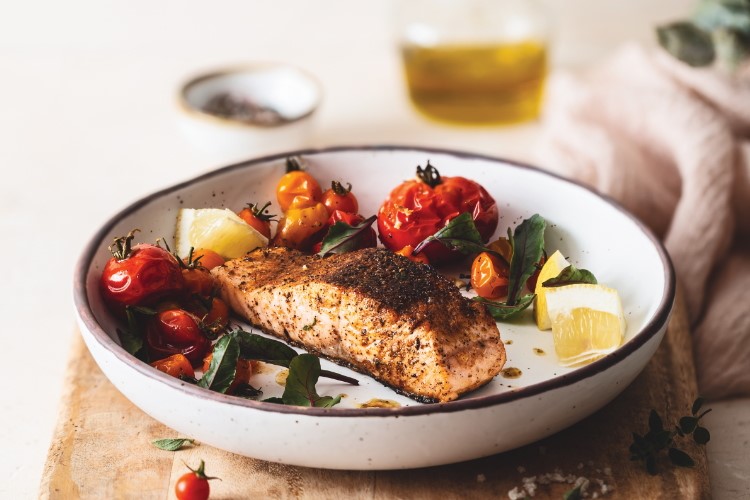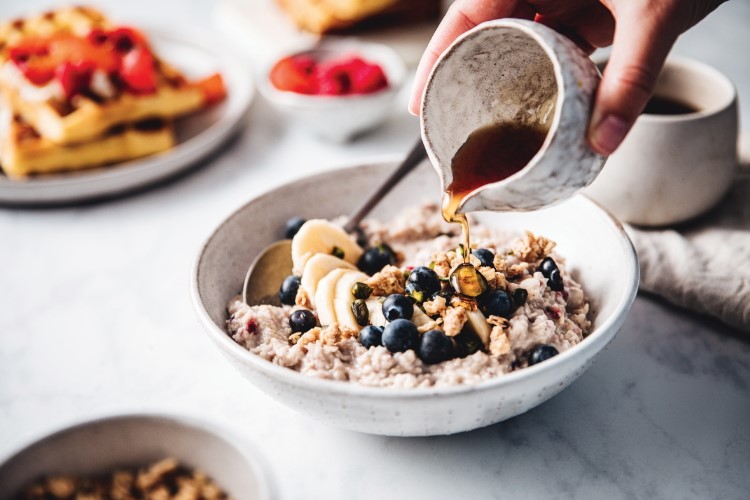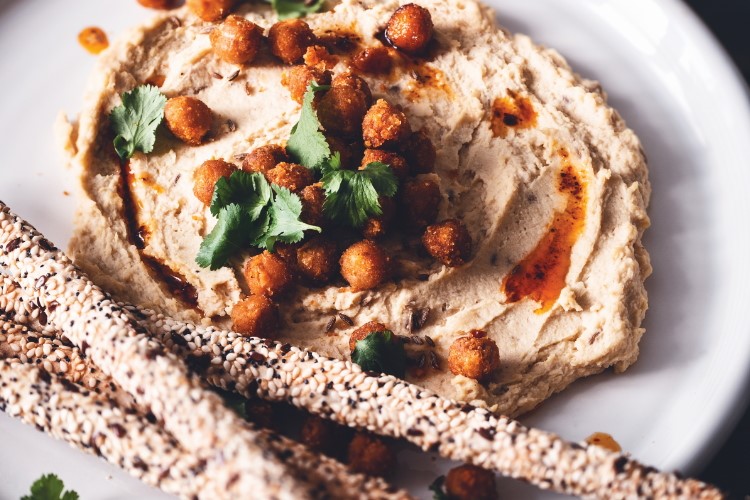Five foods proven to help combat postnatal depression

Nutritionist Claudia Vavasour shares five foods proven to help combat postnatal depression.
Most of us who have had a baby can relate to the term ‘baby blues’. Those feelings of tearfulness and vulnerability during the first week after baby is born. This usually passes within a few days, but of all the women who go through miscarriage or birth in New Zealand, 15% will go on to experience a more serious condition known as Postnatal Depression or PND (BPAC 2020). It can be absolutely devastating and, having been one of the 15% myself, I know all too well how it can rob you of your happiness (albeit a tired happiness!) in those early months.
A woman’s nutrient depletion and dietary patterns during pregnancy have gained increased attention over recent years. Diet is now viewed as a modifiable risk factor to both the prevention and treatment of depression. The cause of PND is not fully understood. There are multiple complex contributing factors, many of which are largely outside our control. But evidence suggests that nutrient depletion which occurs throughout pregnancy can increase your likelihood of PND. So, let me take you through five foods that science says can help prevent PND.

Super salmon
First off the ranks is salmon. To date, most of the research on nutrition and PND has focussed on omega 3 fats, which is not surprising. Not only is salmon packed full of lean animal protein and vitamins D, A and E, it’s also an excellent source of marine omega 3 fats, EPA + DHA. Plant sources of omega 3 fats (ALA) are important too, but the reason we need the marine sources is because less than 6% of ALA is actually converted to EPA + DHA by the body. Furthermore, maternal stores of DHA can reduce by as much as 50% during pregnancy, which is why we need regular dietary intakes of oily fish and/or supplementation.
Why is salmon so important for mood? Omega 3 fats found in salmon form part of the cell membranes in our brain, with DHA being the most abundant type of omega 3 present in our brain cells. Low intakes of omega 3s and subsequent low omega 3 status inhibits the brain’s effectiveness at passing signals from one brain cell to another. Liken it to going in and out of reception whilst speaking on your mobile phone. The connection can be momentarily lost and you end up with only half the sentence, so the message doesn’t fully get conveyed. Having plenty of DHA ensures good mobile coverage, so you get lovely clear communication, so to speak!
A 2006 American study by J Hibbeln published in the Journal of Affective Disorder found an association between the DHA content of mothers’ breastmilk and PND. Higher concentrations of DHA in the milk and greater seafood consumption both predicted lower prevalence rates of PND. On the flip side, it also found that women with low levels of DHA had higher rates of PND. Adding further weight to the research was a 2019 Randomised Controlled Trial (RCT) from Macquarie University in Sydney, which showed that ‘healthy diets’ rich in fish were also associated with a reduced risk of depression.
You can safely enjoy fresh or canned salmon several times a week without concern for heavy metal contamination. I like to add canned salmon to fish pies, and use fresh salmon in a wholegrain noodle salad.
Brilliant Blueberries
Who doesn’t love a blueberry? An absolute staple in my home, with the convenience of frozen blueberries over winter. The vibrant dark blue-purple berry is not only a great source of vitamin C, it has one of the highest antioxidant contents to be found. Blueberries contain anthocyanins, a powerful type of polyphenol, which have been well-documented as being protective against neurodegeneration. Antioxidants act as sponges to mop up free radicals which cause oxidative stress, inflammation and disease and associations have been made between oxidative stress and depression.
A 2015 meta-analysis conducted in China showed that lower antioxidant levels and higher oxidative stress levels were more common in depressed women compared to healthy controls. And the ‘healthy diet’ which researchers from Macquarie University found would reduce depression rates was also rich in fruit. Blueberries are so versatile, especially because they freeze so well. They’re fantastic in muffins and smoothies, and can be enjoyed fresh as a snack on their own.

Powerful Probiotic Yoghurt
There are two reasons why a natural probiotic yoghurt is beneficial for mood. Firstly, yoghurt is a naturally fermented food containing live probiotics, aka ‘good bugs’. Yoghurt and kefir (a thinner type of yoghurt for drinking) are two fermented dairy foods which help to colonise the large bowel, creating a healthy and diverse microbiome.
I’m sure you’ve heard of the gut-brain connection, the bi-directional connection between our gut microbiome and our brain – think butterflies in your stomach when you’re nervous. Research has shown that changes in the gut microbiome may influence brain activity, including mood. Dairy foods are also a source of tryptophan, which is an amino acid needed to make the ‘happy’ hormone serotonin.
The second reason natural probiotic yoghurt is beneficial for mood is the independent effect of dietary calcium on mood, and dairy foods are the best source of calcium by a long shot. A study published in the Archives of Women’s Mental Health, which was actually designed to assess the impact that calcium supplementation had on pre-eclampsia, stumbled across the unexpected but statistically significant finding that those treated with calcium had significantly less PND.
I recommend a natural whole-fat probiotic yoghurt, but if you prefer something with flavour, then choose one which has <8g/100g sugar. The honey and vanilla varieties are usually the lowest in sugar, but be sure the yoghurt contains live probiotics, such as lactobacilli and/or bifidobacterium. Yoghurt serves as a great snack on its own, or with muesli or in smoothies. It also makes for nutritious dressings.
Remarkable Rolled Oats
I’m not sure we need another great reason to enjoy porridge in the mornings, but just in case you’re questioning your love of the humble oat, here are some more benefits. Not only do oats help to keep you regular, they’re rich in wholegrain carbohydrates, regulating our blood sugars and energy levels, as well as containing a high amount of my favourite superfood – prebiotic fibre.
Prebiotic fibre is basically fuel for those ‘good’ bugs we talked about earlier, helping them to flourish in numbers in our microbiome and to release their anti-inflammatory goodness. Prebiotics to probiotics are like yin to yang, so we need both for a healthy gut-brain connection and to help support healthy mood. With porridge season almost over, you can still add oats to your smoothies and try switching just one quarter of a cup of white flour for rolled oats in your baking for an added prebiotic fibre boost. The best type of oats to choose are either your wholegrain rolled oats or standard rolled oats. My top tip: try to avoid the sachet versions as they’re loaded with added sugar.

Choice Chickpeas
This useful legume is an excellent source of zinc, which is famous for its benefits in wound healing; and let’s face it, we could do with a bit of that post-birth! Interestingly, observational studies have linked lower intakes of zinc with increased rates of PND. Legumes form an important basis to the Mediterranean diet and ‘healthy diets’ which have found to be beneficial for PND. They’re also a great source of prebiotic fibre and protein. You can make your own hummus using canned, rinsed and drained chickpeas, and add them to fritters and salads.
Blending it all together
Armed with these five foods to help you ward off those baby blues, I’m sensing a lot of oaty-blueberry smoothies at your house, and chickpea-salmon fritters on the menu! Remember though, it’s the whole dietary pattern which has the biggest impact. The evidence strongly supports a Mediterranean-style diet to treat depression, but also to help prevent its onset.
These are five of the top nutrient powerhouse foods which you can regularly include to help, but if you’re struggling with persistent baby blues then another thing you can do is book in a free chat with me to see how we can nourish your body correctly. Let’s reduce these symptoms to give you back your happiness at such a special time in your life, so you can get back to doing what’s most important – relishing those baby snuggles and enjoying this stage of motherhood.
Claudia Vavasour is a New Zealand Registered Dietitian and Nutritionist, and an expert in fertility nutrition. Claudia is busy growing her little girl Saskia and her private practice fertilitynutrition.co.nz, where she sees couples or individuals for women’s health, fertility and pregnancy nutrition. Connect with Claudia on Instagram @fertility_nutrition_dietitian.

AS FEATURED IN ISSUE 51 OF OHbaby! MAGAZINE. CHECK OUT OTHER ARTICLES IN THIS ISSUE BELOW

















